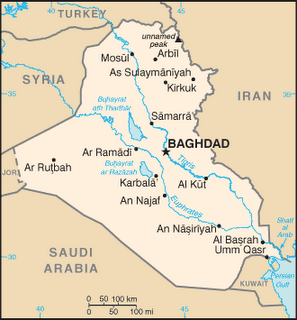 (Source: Wikipedia)
(Source: Wikipedia)It appears that the Iraq Study Group, which is expected to release a draft report today, will not set a timetable for a withdrawal of US troops from Iraq. Rather any withdrawals will continue to be linked to progress in the performance of Iraqi troops. This is likely to change when the group releases its final report in December. More and more people are coming to the conclusion that as long as America promises to "stay the course," the Iraqi government will continue to do nothing to protect its citizens.
Meanwhile, American commanders on the ground and voters at home are tired of sending their soldiers on patrols that turn them into target practice for Sunni and Shi'a militiamen. Americans are sick of losing their sons and daughters to an insurgency and a civil war that seems only to be exacerbating. And it is not as if Iraqis have been especially grateful (for what after all - the chance of being one of the more than 100 people killed on a given day?) to American efforts.
It's funny that the specter of an American withdrawal has elicited public protests by the Iraqi government, when most of its Shi'a ministers have been half-hearted at best in supporting American operations against the militias. Just a few months ago, it still sounded as if they couldn't wait to get rid of the US troops soon enough. Most ordinary Iraqis apparently still support attacks on American soldiers by the "insurgents" - i.e., by the same people who are blowing up Iraq civilians on public streets.
I don't see why American troops should be patrolling districts infested with insurgents. Especially when they have been so powerless to bring about any real improvement in the lives of most residents of these areas, who in any case don't want the Americans there. Can matters really get so much worse once the Americans leave those districts? Let the Sunni and Shi'a militias fight it out; once they get tired, in ten or twenty years, they will come to an agreement.
In the meantime, US troops should re-deploy to bases in Iraqi Kurdistan in the north, and to some of the other well-fortified installations in the Shi'a south, with a continued presence in key parts of Baghdad and other major cities. Ensconced in these bases, America's troops should focus on guarding communications lines and on staging in-and-out raids on militia forces poising a threat to American bases. In Kurdistan, US troops will be able to work closely with the local population and militias against attacks by Sunni insurgents on strategic sites. An American force stationed here would also assuage Kurdish fears of a Turkish attack. In the south and along the eastern border of the country, the focus should be on maintaining a credible force against Iran, should the need arise.
Given this scenario, US troop deployment could be cut to 80,000. That is still a very significant presence and a major investment. But hopefully it will result in a dramatic decrease in US casualty rates. It simply does not make sense to keep sending American soldiers to the shooting galleries of Anbar province to be picked off by insurgent snipers.
Update by John: Nawaf Obeid, a Saudi security analyst, recently gave a semi-official Saudi policy statement on Iraq in the Washington Post. In essence, he stated the obvious: in the event of a US withdrawal from Iraq, Saudi Arabia will not stand idly by as Iran extends its influence and props up the Shi'a. Here's a quote from a Reuters article:
Nawaf Obaid, writing in The Washington Post, said the Saudi leadership was preparing to revise its Iraq policy to deal with the aftermath of a possible U.S. pullout, and is considering options including flooding the oil market to crash prices and thus limit Iran's ability to finance Shi'ite militias in Iraq.
"To be sure, Saudi engagement in Iraq carries great risks -- it could spark a regional war. So be it: The consequences of inaction are far worse," Obaid said.
The article said the opinions expressed were Obaid's own and not those of the Saudi government.
"To turn a blind eye to the massacre of Iraqi Sunnis would be to abandon the principles upon which the kingdom was founded. It would undermine Saudi Arabia's credibility in the Sunni world and would be a capitulation to Iran's militarist actions in the region," he said.
Five years after the collapse of US-Saudi relations following the 9/11 attacks, Saudi Arabia has redeemed itself as America's trusted client (partner?) in the Middle East. A client is most effective when his interests overlap with those of the patron. If Iran can act as a spoiler in Iraq, who says that America and its local allies can't do the same after an American withdrawal? The Saudis have a lot of experience in that role from their days in Afghanistan. In the Iraq case, their incentive to intervene is 100 times greater and their capacity to effect change is also more formidable.
No comments:
Post a Comment